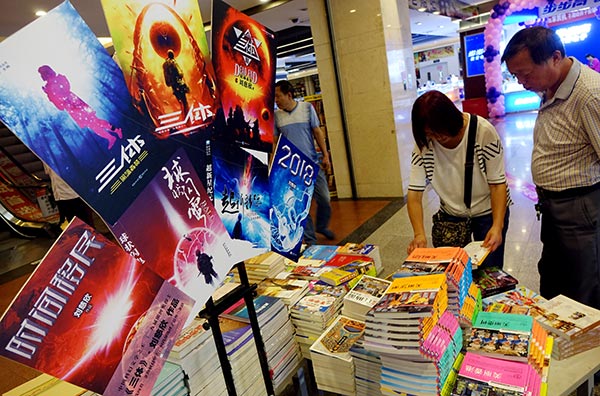The troubled universe of Chinese sci-fi
By Yang Yang ( China Daily ) Updated: 2015-10-17 10:08:46
 |
|
Science fiction works have a limited audience in China, which means it is difficult for the number of writers to find a critical mass. [Photo by Sha Lang / SHIJUE.ME] |
"When Mo Yan won the Nobel Prize, did that take China's mainstream literature to a new level?" he asked pointedly.
Just as Mo became a household name in China after his win, Liu's international success with his trilogy has brought both him and science fiction writing to the attention of people who would not have heard of either before. However, Yao Haijun laments that for all Liu's success, it has registered barely a ripple on the fortunes of science fiction in China generally, "which is unexpected and a great pity".
Although the trilogy has become the top best-selling science fiction in decades, Wu Yan, a science fiction writer and professor at Beijing Normal University, says that the seemingly impressive sales of 2.1 million copies of The Three-Body Problem trilogy since 2007 are in fact mediocre, particularly compared with bestsellers at the end of 1970s. He cites Ye Yonglie's Xiaolingtong in a Future World, which sold 1.6 million copies after it was published in 1978.
In addition, he says, while Liu can boast of being on bestseller lists in China, sales compare poorly with those of other genres, and Liu is the solitary science fiction writer who figures on such lists.
"That's because for many years mass readers in China have not read science fiction, and they know little about it," Wu says.
That brings us to the nub of the problem with science fiction in China, he says, the lack of a reader base, the reason for that being that no one in China writes science fiction for teenagers. Yet that has not always been the case. In fact, at one time the central government used science fiction to promote scientific development in the country, and it was extremely popular in primary and middle schools, Wu says.
"When youngsters grew up, many continued to read science fiction. But these days few primary-and middle-school students read the genre, and suddenly you want them to read The Three-Body Problem. It's very strange for them."
That shortage of readers then creates a phenomenon not from the pages of science fiction, but of cold reality: a vicious circle. Because there are so few readers, few Chinese are interested in, let alone capable of, writing science fiction, and because the few writers produce few good works that creates ... a shortage of readers.Nevertheless, the younger generation of science fiction writers in China, such as it is, is highly creative, having grown up reading the genre, Wu Yan says. But the works of many of these writers come across as simple and naive when they write of life, and they need time and experience to mature into good writers, he says.
None of that is particularly new, for China's relationship with science fiction has run hot and cold since the first work of its kind in the country was published 111 years ago. When the central government used works of the genre to promote the nation's "march into science" in the 1950s the first science fiction wave was created.
That eventually subsided, until when, after the "cultural revolution" (1966-76), science became hot again and many science fiction publications were started, including Science Fiction Literature, a monthly that had a circulation of 200,000. Indeed, science fiction was so popular in China at that time that the country's first movie, play and cartoon in the genre all came out then.
However, in 1983 government figures decried science fiction literature as "spiritual pollution"; the tale of finding a soft-shell dinosaur egg on the Qomolangma, also known as Mount Everest, was dismissed as "pseudoscience"; and the story of a man taking a robot as his wife was called obscene.
Many publications were shut down, the circulation of Science Fiction Literature plummeted to 10,000, and in 1991 it changed its name to Science Fiction World and began to target students as readers.
Two years later, Wang Jinkang, 45, stumbled across a copy of Science Fiction World at a book stall in Nanyang, Henan province, and sent stories he had written for his son to the magazine, setting in train a thawing of the ice into which the genre had gone into hibernation 10 years earlier.From 1993 to 1998 Wang published four to five science fiction stories in the magazine each year, becoming one of the most important writers of the genre in China.
In 1999, either as a stroke of luck or of marketing genius, Science Fiction World had the biggest breakthrough since it was founded almost a quarter of a century earlier. That year the topic in the writing section of China's college entrance exams was implanted memories, an idea straight from the pages of science fiction.
A week before the exam, implanted memories was the magazine's theme for that issue, and overnight Science Fiction World became extremely popular, circulation soaring to nearly 400,000 copies.
Also in 1999, Liu Cixin published his first short story in the magazine and would eventually take on cult status. Since then the magazine has nurtured the best science fiction writers in China, including Liu and Han Song, and younger-generation writers such as Bao Shu and Zhang Ran.
In the intervening years the magazine's circulation has fallen back to 120,000 copies an issue, and these days it is the only science fiction periodical left in China. Online platforms in the country for science fiction writing remain immature, which raises the question of how new writers can be cultivated.
|
|
|
|
|
|
|
|

























 Raymond Zhou:
Raymond Zhou: Pauline D Loh:
Pauline D Loh: Hot Pot
Hot Pot Eco China
Eco China China Dream
China Dream China Face
China Face






